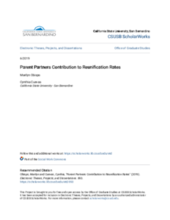This section highlights resources focused on the participation of parents and caregivers in decisions about children's care, including decisions about their own children and their placement in alternative care, as well as advocacy efforts to reform systems of care and protection for children.
Displaying 41 - 50 of 90
This article reports on the analysis of 11 qualitative interviews with parents who had attended child protection case conferences (CPCCs) in Scotland.
This series—which begins with a focus on schools— exposes the harm of punishing parents instead of addressing the root causes of child welfare involvement in the U.S.
‘Children Safe, Family Together', the new family and kin care model outlined in this paper forms an integral part of the overall strategy being currently implemented by Territory Families (TF) to transform Out-of-Home Care in the Northern Territory (NT) and address worrying trend data pointing to the significant over-representation of Aboriginal and Torres Strait Islander children in the NT child protection system.
This article describes David Tobis's keynote address at the Family Inclusion Network South East Queensland’s Global Day of Parents Forum and the story of the parents and allies who changed the child protection system in New York City.
This Casey Family Programs issue brief looks at the use of peer mentors (“parent partners”) who work with parents entering in and engaging with the child welfare system.
The following research study aimed to discover the relationships and contributions that parent partners have in the reunification process of parents and children within the child welfare system.
The current study used a quasi-experimental design and propensity score matching to examine the outcomes for children of families served by the Iowa Department of Human Services Parent Partner program, a peer support program to mentor parents who are currently involved in the US child welfare system.
This study utilizes a quasi-experimental propensity score matching design to assess the causal impact on child welfare outcomes when parents facing an abuse or neglect case in the New York City Family Court were provided interdisciplinary law office representation as opposed to a standard panel attorney.
This report from the Parliamentary Assembly of the Council of Europe looks at the right of donor-conceived persons to know their origins in a global context where more than 8 million children worldwide have been born as a result of assisted reproductive technologies.
According to this report, children of prisoners in the UK are an "'invisible’ group – currently, children are not systematically identified or assessed when a parent goes to prison." The report aims to improve understanding of: who this ‘invisible’ group of children is; the extent, nature and root causes of their poorer outcomes; and how a whole family approach can be used to improve outcomes for children and parents and what needs to change.




